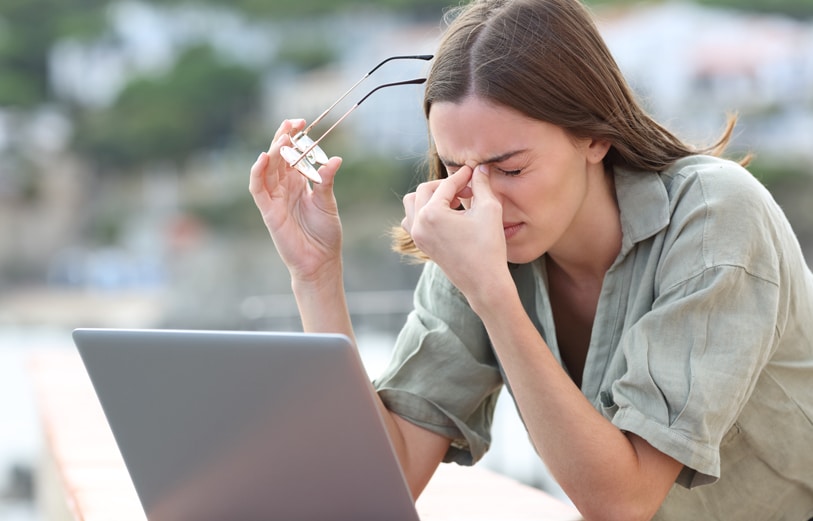Protecting Your Eyes: 10 Essential Tips for Better Eye Health

Increased exposure to UV rays and other environmental factors can take a toll on your eyes.
Protecting your eyes for a lifetime.
Protecting your eyes is crucial to maintaining long-term eye health. The following are 10 different ways you can continue protecting your eyes to keep your eye health and vision at their best.
#1. Wear sunglasses with UV protection.
Wearing sunglasses is one of the easiest and most effective ways to protect your eyes. Ensure that your sunglasses block 100% of both UVA and UVB rays. Prolonged exposure to these harmful rays can unquestionably increase the risk of cataracts and macular degeneration.
Polarized lenses can also reduce glare, which is especially helpful while driving or spending time near water.
#2. Don a wide-brimmed hat.
Pairing your sunglasses with a wide-brimmed hat offers extra protection. In fact, a hat with a brim of at least three inches that encircles your head can block approximately half of the surrounding UV rays. Hence, your delicate facial skin and your eyes are further protected from direct sunlight.
#3. Use artificial tears.
Dry and windy conditions can exacerbate eye irritation. Likewise, air-conditioned environments can also dry out your eyes. Fortunately, artificial tears or lubricating eye drops can help maintain moisture and keep your eyes comfortable. Use eyedrops safely and according to the product instructions for maximum benefit.
#4. Avoid rubbing your eyes.
Seasonal events can increase allergens like pollen and dust, which can irritate your eyes and cause you to rub them. Unfortunately, rubbing your eyes can transfer dirt and bacteria, leading to abrasions and potential infections.
Instead, resist direct contact with your eyes and reduce irritation by applying a clean, wet washcloth over your eyes or instilling eye drops.
#5. Protecting your eyes with eyewear.
Protective eyewear is essential for swimming, sports, and yard work. Accordingly, wear eye protection designed for your activity and risk level. For example, goggles can protect your eyes from chlorine and debris, while sports glasses can prevent injuries from physical impact.
#6. Be mindful of screen time.
Long hours in front of screens (TVs, computers, and cell phones) can contribute to dry eyes, which can also lead to digital eye strain. Adjust your screen brightness or purchase a digital screen protector to reduce the amount of blue rays emitted by your device.
Personal protection, such as blue ray-blocking glasses, can also be helpful.
Your best bet is to give your eyes a break and improve your health by following the 20-20-20 Rule. Every 20 minutes, take a 20-second break and look at something 20 feet away. This can help reduce eye fatigue, protect your vision, and refresh your eyes.
#7. Stay hydrated.
Hydration is key to overall health and is especially important for the eyes. Not surprisingly, dehydration can lead to dry eyes and irritation. Ensure you drink plenty of water throughout the day to hydrate your body and your eyes adequately.
#8. Eat a balanced diet.
A diet rich in vitamins and minerals can support eye health. Foods high in omega-3 fatty acids, such as fish, and those rich in vitamins A, C, and E, like citrus fruits and nuts, can help maintain good vision. Likewise, leafy greens and colorful vegetables are also excellent for your eyes.
#9. Schedule regular eye exams.
Regular eye check-ups are important for detecting early signs of eye conditions. Even if you don’t have vision problems, an annual eye exam can help ensure your eyes remain healthy and address issues before they become serious.
#10. Avoid smoking.
Smoking is harmful to your overall health and particularly damaging to your eyes. It also increases the risk of developing cataracts, macular degeneration, and dry eye syndrome. So, if you smoke, consider quitting to improve your eye health and overall well-being.
If you can’t quit, reduce your use of tobacco products and avoid “smoking” in enclosed areas. Reducing exposure to the harmful irritants produced by smoking protects everyone’s health.
Your eyes are worth protecting.
Protecting your eyes is about taking simple, proactive steps. Your eyes are precious. Follow the suggestions above to safeguard them now and look forward to a lifetime of vision.

